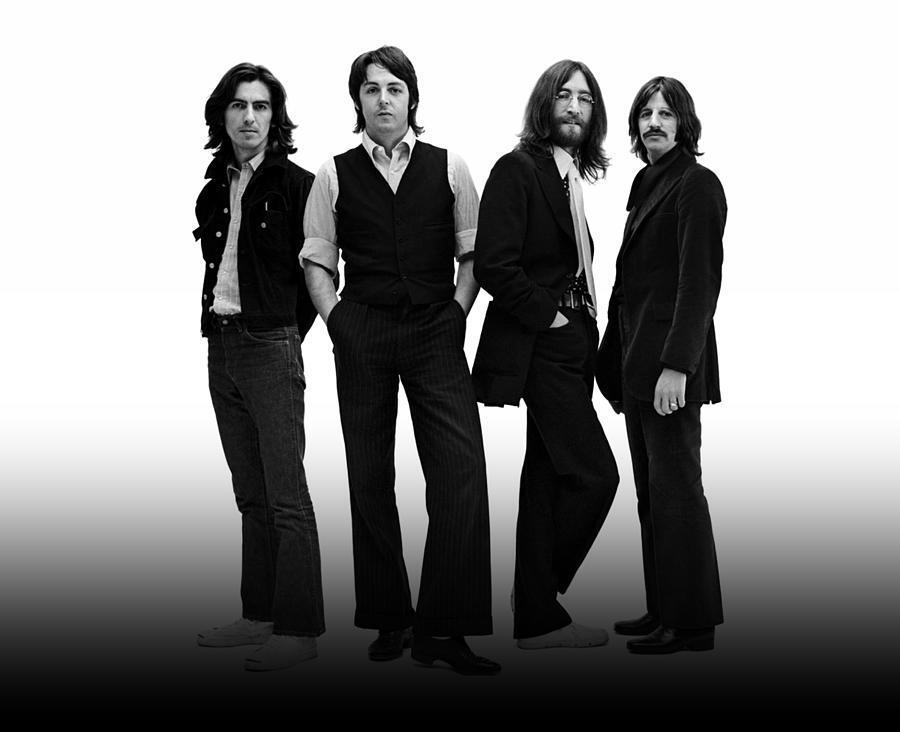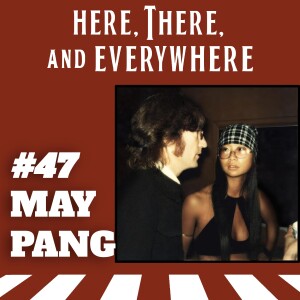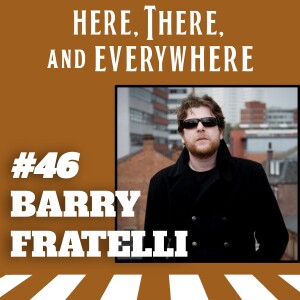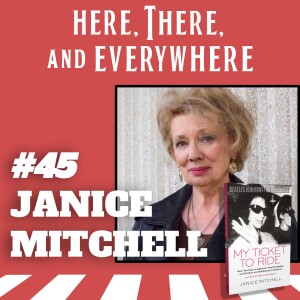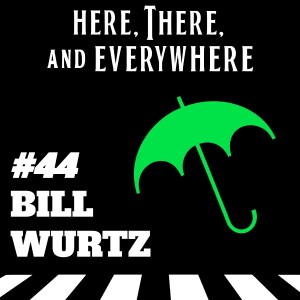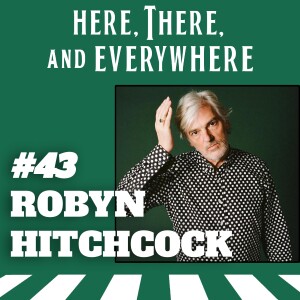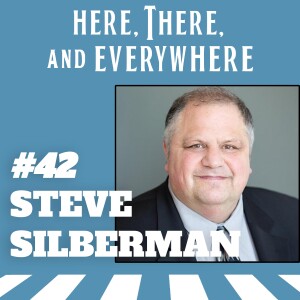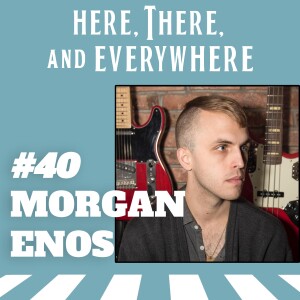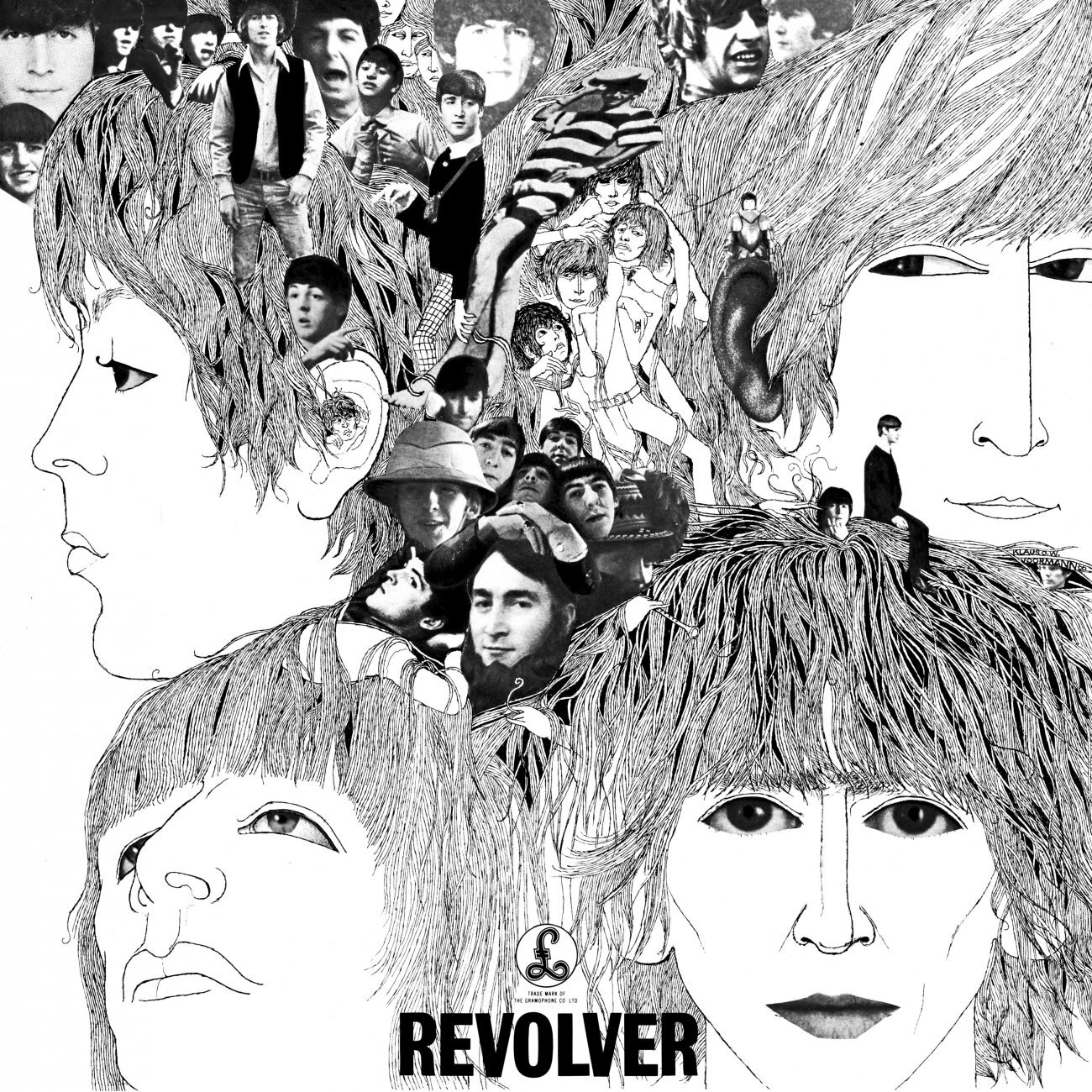In this episode of the "Here, There, and Everywhere" podcast, host Jack Lawless is joined by the multi-talented musician, songwriter, video producer, and internet personality, Bill Wurtz. Together, they discuss Bill's music, his inspirations, and how he got started writing songs. They also delve into one of Bill's biggest musical influences, The Beatles - in particular, the incredible talent of Paul McCartney. Bill shares his thoughts on the recently released Get Back docu-series, providing a unique perspective on this behind-the-scenes look at the creative process of one of the most iconic bands of all time. If you're a fan of music, The Beatles, or just great conversation, this episode is not to be missed. So, turn off your mind, relax, and enjoy the "Here, There, and Everywhere" podcast with Bill Wurtz. Don't forget to subscribe for more exciting guests and thought-provoking conversations!
Check out Bill's YouTube page: https://www.youtube.com/user/billwurtz
Follow Bill on Twitter: https://twitter.com/billwurtz
If you like this episode, be sure to subscribe to this podcast! Follow us on Twitter and Instagram. Or click here for more information: Linktr.ee/BeatlesEarth
-----
The Beatles were an English rock band, formed in Liverpool in 1960, that comprised John Lennon, Paul McCartney, George Harrison and Ringo Starr. They are regarded as the most influential band of all timeand were integral to the development of 1960s counterculture and popular music's recognition as an art form. Rooted in skiffle, beat and 1950s rock 'n' roll, their sound incorporated elements of classical music and traditional pop in innovative ways; the band later explored music styles ranging from ballads and Indian music to psychedelia and hard rock. As pioneers in recording, songwriting and artistic presentation, the Beatles revolutionised many aspects of the music industry and were often publicised as leaders of the era's youth and sociocultural movements.
Led by primary songwriters Lennon and McCartney, the Beatles evolved from Lennon's previous group, the Quarrymen, and built their reputation playing clubs in Liverpool and Hamburg over three years from 1960, initially with Stuart Sutcliffe playing bass. The core trio of Lennon, McCartney and Harrison, together since 1958, went through a succession of drummers, including Pete Best, before asking Starr to join them in 1962. Manager Brian Epstein moulded them into a professional act, and producer George Martin guided and developed their recordings, greatly expanding their domestic success after signing to EMI Records and achieving their first hit, "Love Me Do", in late 1962.
Lennon, McCartney, Harrison and Starr all released solo albums in 1970. Their solo records sometimes involved one or more of the others; Starr's Ringo (1973) was the only album to include compositions and performances by all four ex-Beatles, albeit on separate songs. With Starr's participation, Harrison staged the Concert for Bangladesh in New York City in August 1971. Other than an unreleased jam session in 1974, later bootlegged as A Toot and a Snore in '74, Lennon and McCartney never recorded together again.
Two double-LP sets of the Beatles' greatest hits, compiled by Klein, 1962–1966 and 1967–1970, were released in 1973, at first under the Apple Records imprint. Commonly known as the "Red Album" and "Blue Album", respectively, each has earned a Multi-Platinum certification in the US and a Platinum certification in the UK. Between 1976 and 1982, EMI/Capitol released a wave of compilation albums without input from the ex-Beatles, starting with the double-disc compilation Rock 'n' Roll Music. The only one to feature previously unreleased material was The Beatles at the Hollywood Bowl (1977); the first officially issued concert recordings by the group, it contained selections from two shows they played during their 1964 and 1965 US tours.
The music and enduring fame of the Beatles were commercially exploited in various other ways, again often outside their creative control. In April 1974, the musical John, Paul, George, Ringo ... and Bert, written by Willy Russell and featuring singer Barbara Dickson, opened in London. It included, with permission from Northern Songs, eleven Lennon-McCartney compositions and one by Harrison, "Here Comes the Sun". Displeased with the production's use of his song, Harrison withdrew his permission to use it.Later that year, the off-Broadway musical Sgt. Pepper's Lonely Hearts Club Band on the Road opened. All This and World War II (1976) was an unorthodox nonfiction film that combined newsreel footage with covers of Beatles songs by performers ranging from Elton John and Keith Moon to the London Symphony Orchestra. The Broadway musical Beatlemania, an unauthorised nostalgia revue, opened in early 1977 and proved popular, spinning off five separate touring productions. In 1979, the band sued the producers, settling for several million dollars in damages. Sgt. Pepper's Lonely Hearts Club Band (1978), a musical film starring the Bee Gees and Peter Frampton, was a commercial failure and an "artistic fiasco", according to Ingham.
Accompanying the wave of Beatles nostalgia and persistent reunion rumours in the US during the 1970s, several entrepreneurs made public offers to the Beatles for a reunion concert.Promoter Bill Sargent first offered the Beatles $10 million for a reunion concert in 1974. He raised his offer to $30 million in January 1976 and then to $50 million the following month. On 24 April 1976, during a broadcast of Saturday Night Live, producer Lorne Michaels jokingly offered the Beatles $3,000 to reunite on the show. Lennon and McCartney were watching the live broadcast at Lennon's apartment at the Dakota in New York, which was within driving distance of the NBC studio where the show was being broadcast. The former bandmates briefly entertained the idea of going to the studio and surprising Michaels by accepting his offer, but decided not to.
Bill Wurtz (stylized in lower case as bill wurtz or billwurtz) is an American musician, singer-songwriter, animator, video editor, and internet personality based in New York City. He is known for his distinctive musical, comedic, and narrative style which includes deadpan delivery and singing paired with colorful surrealist, psychedelic, and non-sequitur graphics.
Wurtz first published material on YouTube in 2013. He set up a website in 2014, presenting a catalog of music and videos he had created since 2002. Wurtz proceeded to upload edited versions of his videos on Vine, where he gained his initial popularity. He experienced breakout success on YouTube with his animated videos, History of Japan (2016), and History of the Entire World, I Guess (2017). Wurtz released music videos regularly from 2017 to March 2019. Through the rest of 2019 and all of 2020, Wurtz was inactive on YouTube, returning to the platform in January 2021 with a new visual style of 3D animation.
Wurtz's first recorded composition was an instrumental named "Late Nite Lounge with Loud Lenny" which according to his site was recorded on June 17, 2002, his first recorded song was "stuck in a rut" recorded on March 3, 2005.
Wurtz's first known YouTube activity were on an account called "billynothingshow".
Wurtz was first known for his presence on the short-form video-sharing website Vine, where he first gained a following in 2014. He began by taking short videos he had previously published to his website and re-editing them to fit Vine's six-second restriction.Before transitioning fully to YouTube, Wurtz was uploading a video to Vine nearly every day. He received early attention in 2015 for the short video "Shaving My Piano", which was covered briefly in The Verge. On April 11, 2016, Wurtz won the Shorty Award for "Tech & Innovation: Weird" at the 8th Shorty Awards; during the awards ceremony, attention was given to one of his Vine uploads "I'm Still a Piece of Garbage". Wurtz withdrew from making vines to focus on finishing History of Japan.
Wurtz had originally intended to make a video on US history, but abandoned it.
Alongside interest on Vine, Wurtz achieved wider popularity in 2016 with History of Japan, a nine-minute YouTube video that outlines Japan's history. Wurtz chose the topic due to his lack of knowledge of it. The video covers key events of its history: "Buddhism, internal conflict, alliances with Britain, World War I, World War II, the dropping of atomic bombs and its post-war economic miracle". It showcases Wurtz's quirky visual and comedic style through a mixture of fast-paced narration and animation, intercut with short musical jingles. The video was described as "an entertaining new approach to education". It went viral on social media after its release on February 2, 2016, and under a week later, received over four million views by February 8. It particularly received considerable attention on Tumblr and Reddit. As of August 2021, the video has over 68 million views. German Lopez of Voxcalled it a "strange", "pretty good – and surprisingly funny" video.
History of the Entire World, I Guess was the top video on the YouTube trending page on the day of its release, receiving 3.2 million views on its first day, and on Reddit it became the most upvoted YouTube link of all time. It became an Internet meme and was listed at eighth place on YouTube's list of the top 10 trending videos of the year. As of January 2023, it has over 152 million views.[25] Writer German Lopez for the news website Vox praised the video for not heavily focusing on western and US history, and successfully covering other areas in world history which may be neglected in US schools, such as powers in China, Persia, and India. Because it resists specialization and assembles history in chronological order starting from the beginning of the Universe, history of the entire world, i guess can be considered a work of Big History, and is probably one of the most popular works associated with the discipline. It has been called a "must-see" and is considered to be Wurtz's magnum opus. In 2020, Thrillist ranked the video at number 40 on its list of best YouTube videos of all time.
Wurtz's song "Just Did a Bad Thing" and the accompanying video spawned TikTok videos of people lip-syncing to the opening lines; in the platform, #ididabadthing became the top hashtag of March 2019. Following this, Wurtz would only post four more videos before his break, ending with "Might Quit". After "Might Quit" was released, Wurtz would not post any new videos to YouTube for nearly two years, before continuing to release music and videos animated in 3D with Blender.
Wurtz has developed an absurdist, surreal style on both his music and animation. Eddie Kim wrote for MEL Magazine that Wurtz "refuses to mimic anyone else's animation or musical style, but it's not weird for weirdness' sake alone", comparing him to Thundercat and Louis Cole and highlighting Wurtz's pretty pop melodies, unexpected chords and multi-layered rhythms as commonalities. Geoff Carter of Las Vegas Weekly stated: "Merge Don Hertzfeldt, Jenny Holzer and Thundercat and you might get someone a little bit like Bill Wurtz". Nick Douglas of Lifehacker summarized him as "somewhere between comedy and education and vaporwave."
Wurtz's music has been classified as jazz-pop, incorporating elements of lo-fi music, smooth jazz, funk and easy listening. Wurtz tends to reject genre categorization, and does not consider himself to be a jazz musician. Overall, his music evokes malaise, self-deprecation, and a "blurring of the lines between irony, parody and honesty".[35] This is often paired comedically with dire circumstances or sobering undertones. In an interview with Genius, Wurtz stated that "it's a good... songwriting technique to write about something bad with a good sounding melody, because if you can get people to feel good about something bad, then you're bulletproof in life." Wurtz's voice has been described as "silky tenor with range and energy". Artists who have expressed admiration for Wurtz's music include indie musicians Daði Freyr and Sidney Gish, fellow YouTube musician Adam Neely, DJ and producer Porter Robinson, as well as Australian singer Sia.
'[Music] theory' may be fun, but it's made of liquid and has a tendency to melt. The music comes first and then you figure out how to describe what happened, although fully describing it can never be done. One of the classical composers said 'We will never understand music, but music understands us readily and instantly'.
Wurtz started playing music at a very early age. He has claimed to be "wholly self-taught" as a musician, and regularly downplays the importance of music theory in songwriting and composition, insisting that the sound and feel of music should be prioritized over attempts to conform to theory. In fact, one of the defining characteristics of Wurtz's style is a subversion to conventional approaches to composition. One example is "I Wanna Be a Movie Star", highlighted in an article for the student newspaper The Harbinger, where the author praised Wurtz's skill in incorporating complex time signatures without causing the music to feel "either incomplete or too long", instead achieving a sound that "feel[s] completely natural" and "pop-ish".
Wurtz has used different programs to edit his music, including GarageBand from 2009 to 2010, and long-discontinued Logic Express 9 until at least 2016.
Videos
Wurtz's videos are typically in a lo-fi, neon aesthetic, and have been described as surreal and psychedelic. They range from "nonsensical" shorts to animated music videos, and often involve deadpan humor, dancing stick figures, vaporwave-like transitions and neon, sans-serif text on-screen. Wurtz often follows similar patterns in his videos such as multi-layering, and clip art images. He has stated the low-budget quality arose out of a necessity to publish videos regularly and evolved naturally.
At Vidcon 2018, Wurtz was asked why his style is so different from other YouTube musicians. He stated that he chooses to "live under a rock" and produce his music in isolation rather than take inspiration from other creators on the platform. Wurtz publicly struggles with perfectionism, making use of schedules and deadlines to overcome it. In response to a fan question he explained that in the process of doing this he has "been forced to become an expert on carelessness".
Website
Wurtz launched his personal website billwurtz.com in 2014. Despite this, it has been compared to a late 1990s website due to its simple design. Apart from containing all of his released songs and most of his videos dating back since 2002, the website also features many other types of content not available elsewhere. For example, Wurtz posts vlog-style 'reality' videos depicting his creative process. Wurtz maintains a section on his website to answer anonymously submitted questions. His answers to questions are considered an aspect of Wurtz's creative output; the style of his answers have been described as "verging on the poetic" and "earnest, if somewhat loopy-sounding".









